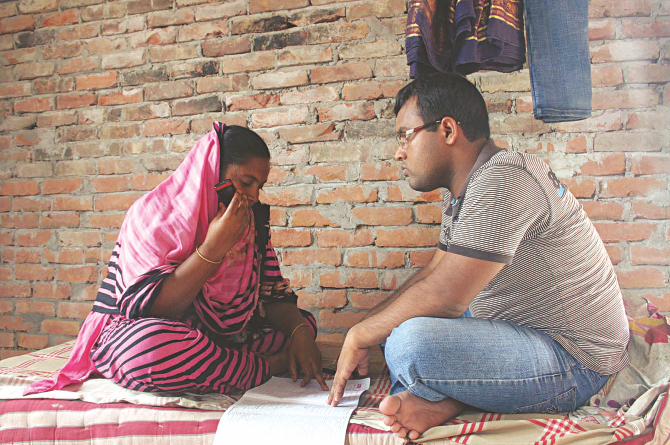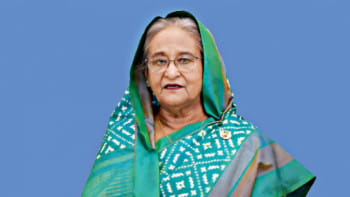Light in the Darkness

Nineteen-year-old Abdullah-Al-Shayem graduated his HSC exams from the Peoples' DG College in Kushtia this year with a GPA of 5. He was the only examinee in this college among the 278 students who took the exam, to graduate with a perfect score. But what makes his achievement more remarkable is that he managed to do this without the ability to see his question papers.
Abdullah suffers from Retinitis Pigmentosa, a hereditary degenerative eye disease that causes severe vision impairment. “The doctors have told me that people usually do not get affected by this illness before the age of 30,” says Abdullah, “It is my bad luck that I started suffering its effects since I was in third grade.” When Abdullah first noticed his weakening eyesight, his parents consulted a doctor in their village Goborgara, Dawlatpur Upazilla in Kushtia. “The doctor was not able to diagnose me properly, and not understanding the extent of my illness, I did not get the treatment I needed,” says Abdullah.
He continued his studies, always coming out first in every class until he reached class 10, when his vision diminished significantly. During his SSC exams, he had trouble reading his question paper despite the table lamps he kept on his desk to aid him. “I could not write properly and my lines were overlapping. I graduated with a 4.0 GPA that year,” he recalls. “That was a terrible time for me; I broke down mentally and did not want to continue my education.”
Abdullah's father, Munirul Islam, who is a farmer in Kushtia was already in dire financial constraints trying to support his wife China Khatun and two children. His property consists of two and half bighas of land and two cows. Despite this however, his parents brought him to Dhaka to see and eye specialist at Islamia Eye Hospital and Ispahani Institute of Thalmology as a last resort. He was completely blind by this time.
The specialist at this hospital informed the family that Abdullah would not able to regain his vision. “During this time, my parents and my teachers all encouraged me to not give up hope and that helped me beyond imagination,” says Abdullah. “When we returned to Kushtia, my family contacted a school for the disabled that would allow me to study using Brail, but in order to take my HSC exam I would have to go to Dhaka and we did not have money for that.”
At this time, a staff member of this school, Enamul Haque (late), advised him to record his textbooks in order to study. If he was able to do so, he would be allowed to take his HSC exam using a proxy writer. “My mother advised me to use a mobile phone for the recording. She herself did not study past the class 7, so it is important to her that her children are properly educated,” says Abdullah. “Every night, after completing her housework, she would record my study material and I would memorise what she read.”
His professors and headmaster at Peoples' DG College were so impressed by his desire to learn, he was exempted from paying his fees. The college even offered to pay the entrance fee of his exam.
Abdullah has now gained enough confidence to plan his future. “I would like to continue my higher education in Dhaka University studying either Political Science or Law. I would also like to do my Masters one day,” he says.
“People like me are hardly ever talked about; I was surprised when Prothom Alo, and then The Daily Star wanted to write about me. I am grateful for the recognition and hope I will continue to excel in whatever I choose to do.”


 For all latest news, follow The Daily Star's Google News channel.
For all latest news, follow The Daily Star's Google News channel. 



Comments